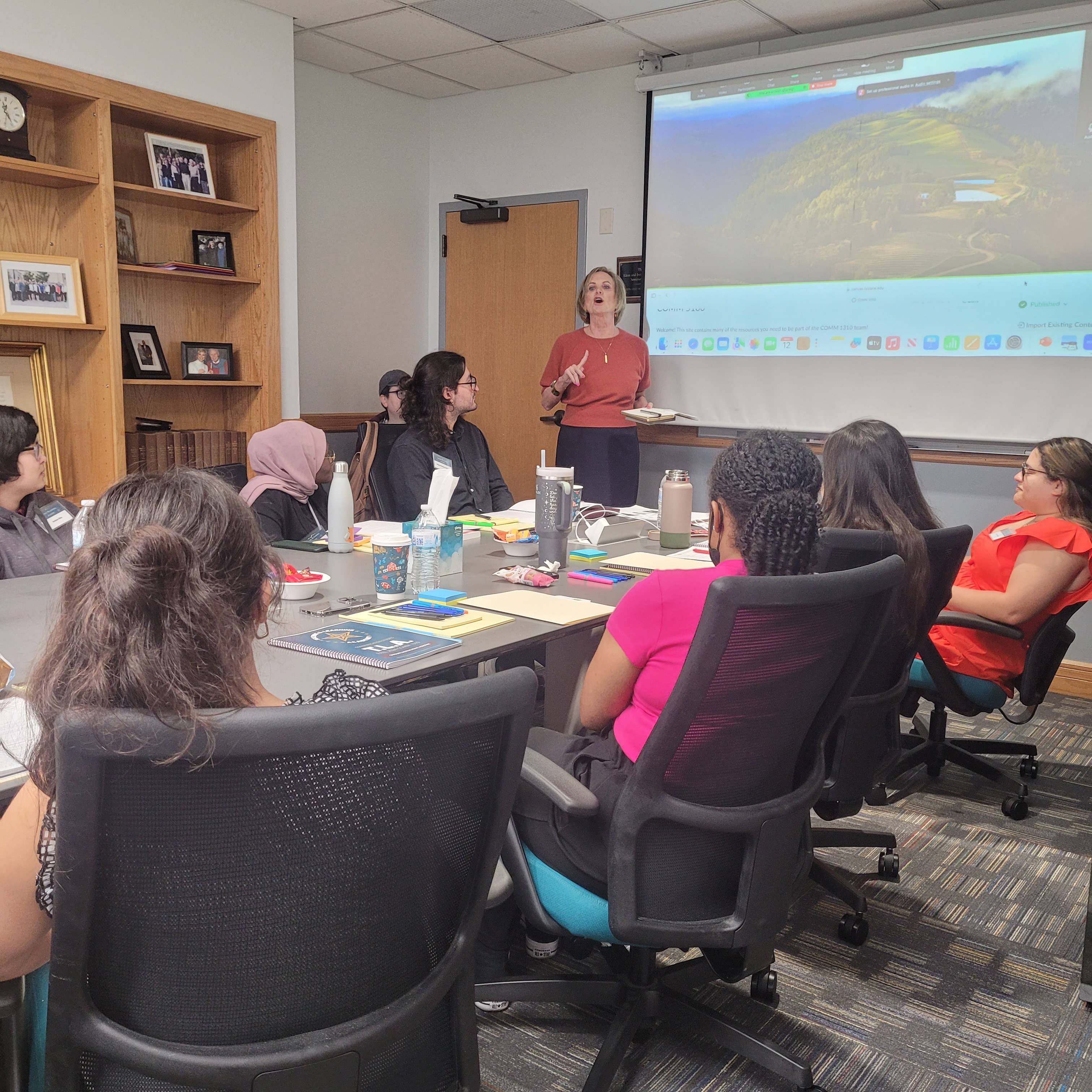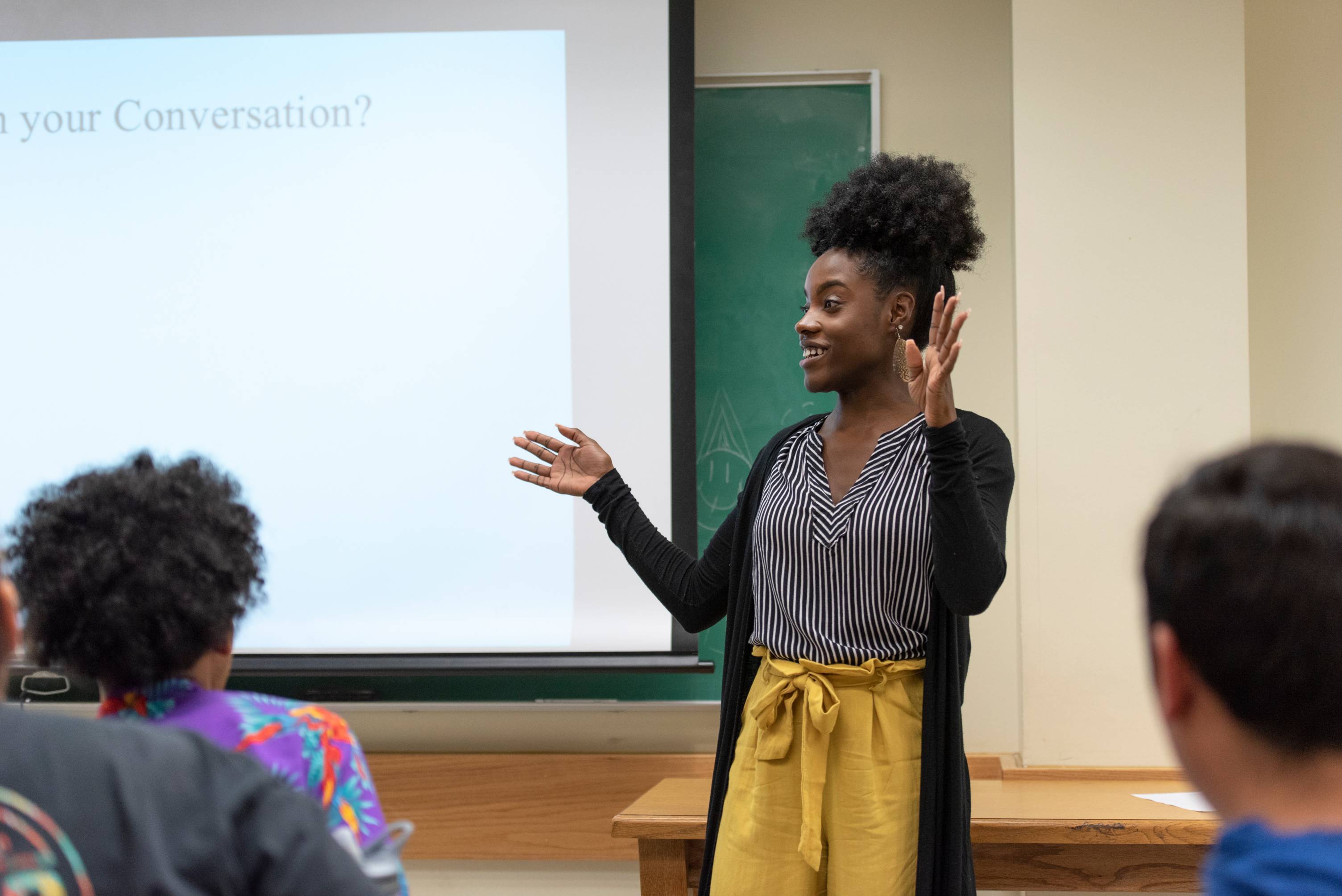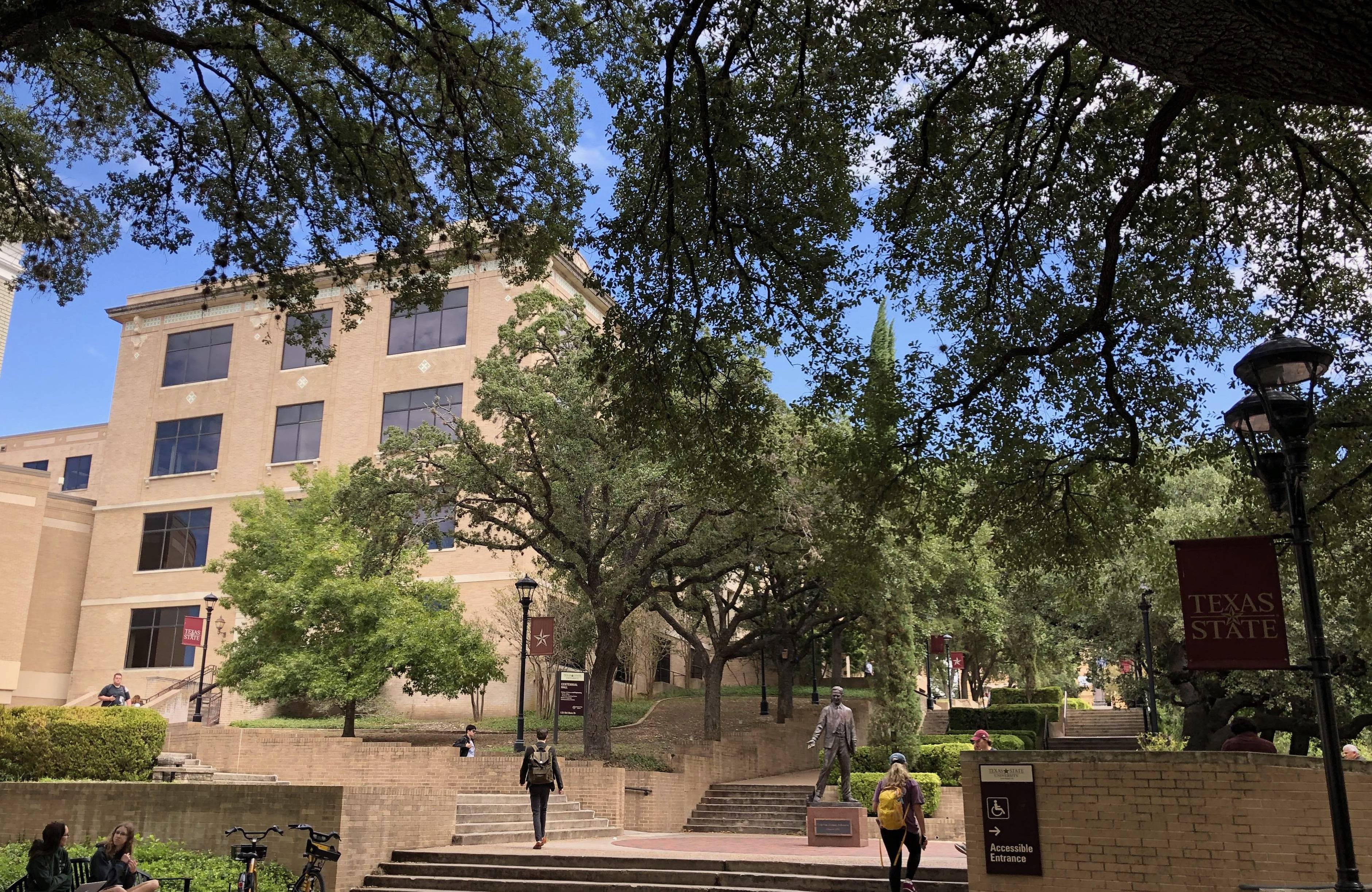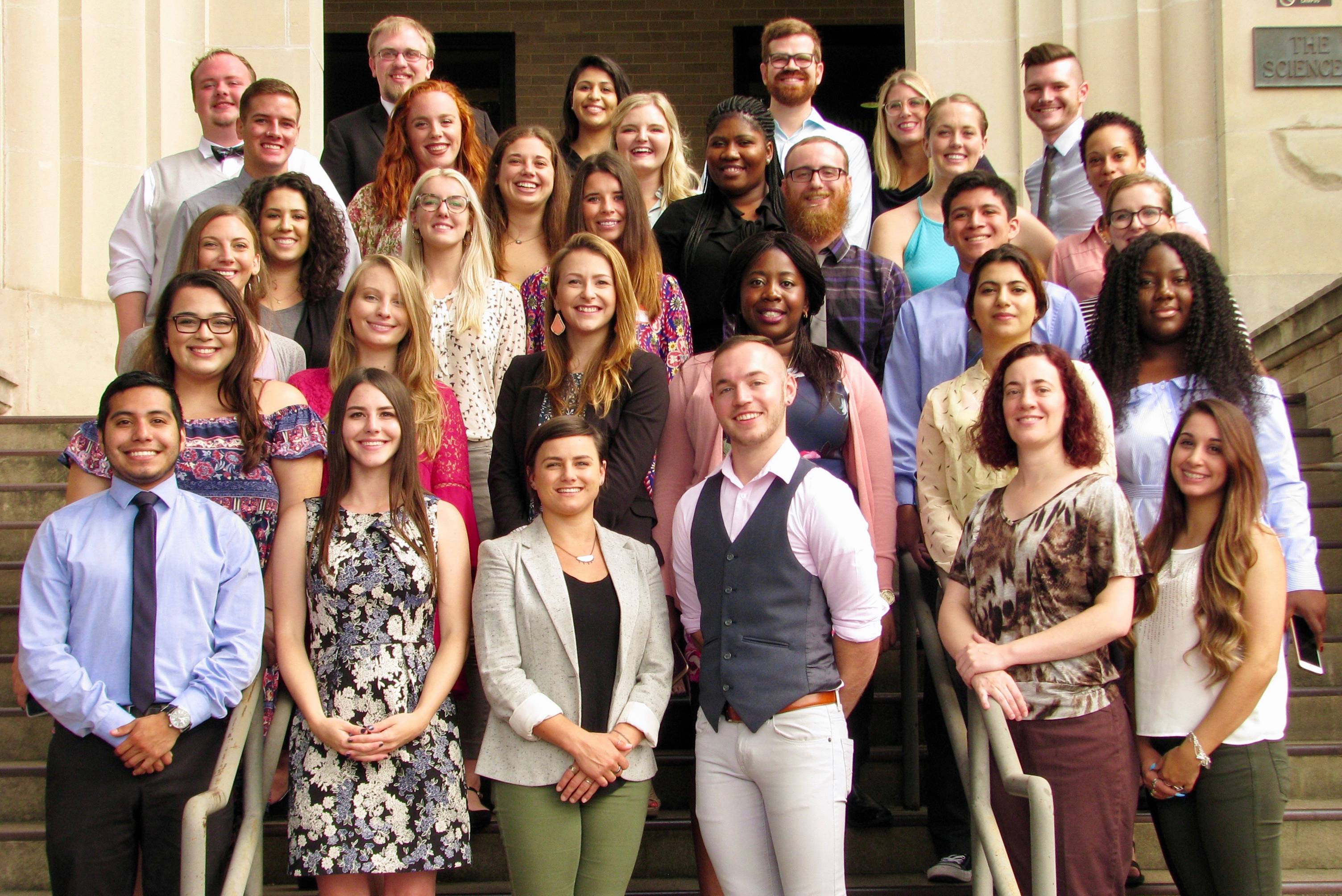One of the top Communication Studies Master's programs in the country, our graduate students investigate communication processes impacting our personal, professional, and public lives. Our applied approach allows for students to explore research programs unique to their own interests.
MA in Communication Studies
One of the top Communication Studies Master's programs in the country, our graduate students investigate communication processes impacting our personal, professional, and public lives. Our graduates pursue careers applying communication research in profit, nonprofit, and governmental organizations. Students who are Graduate Instructional Assistants earn financial support during school while taking part in a world-class teacher training program through or department's Teaching & Learning Academy.

M.A. in Communication Studies
Students may pursue a 36-hour degree culminating in a Master's Academic/Professional Portfolio (MAPP) or a 30-hour degree that includes a thesis
After completion of two required courses, students can design their own customized programs from the courses in our curriculum.
Enrollment in most of our graduate courses is limited to 18 students. The seminar format allows students to receive individual attention and to explore research programs unique to their own interests. Most classes are offered in the evenings to accommodate working students.
Specializations
While everyone who earns their MA in Communication Studies will take a diverse set of courses that familiarize students with the variety our discipline has to offer, some students may wish to focus on a particular aspect of communication. Although there is no required sequence of courses for any single area of interest, the following guides may assist students in providing a focal point to their communication studies:
-
Communication Training and Development
Students who focus on Communication Training and Development explore the knowledge and skills needed to enhance communication performance. Courses may include Communication Training and Development, Organizational Communication, and Communication Assessment. A Certificate in Corporate Communication and Training is also available to students who complete a prescribed nine-hours of curriculum.
-
Persuasion, Advocacy, & Civic Engagement
Courses in Persuasion, Advocacy, and Civic Engagement prepare students to research and produce public messages designed to create social and political change. Students learn how to analyze situational resources, challenges, and audiences to determine the best messages for creating change.
- 5325 – Human Communication Theory
- 5329B – Communication & Negotiation
- 5329J – LGBTQ+ Rhetoric & Advocacy
- 5329L – Communicating Diversity & Inclusion
- 5329M – Health Communication Campaigns
- 5329N – Rhetoric of Diversity
- 5331 – Persuasive Communication
- 5340A – Rhetorical Movements
- 5340B – Free Speech & Extremism
- 5340C – Rhetoric of Women’s Rights
- 5340D – Argumentation & Public Advocacy
- 5340E – Science, Health, & Environmental Rhetoric
- 5340F – Rhetorical & Critical Perspectives on Health Communication
- 5344 – American Speeches
- 5345 – Political Communication
- 5355 – Media Criticism
- 5374 – Organizational Rhetoric
Students who focus on health communication investigate the essential role of communication in health situations through a variety of courses that may include Health Communication, Critical Health Rhetoric, Communication in Health Organization, and Relational Health Communication. Coursework in health communication explores topics such as barriers to patient and provider interactions, health communication leadership, health disparities, healthcare training and assessment, health in relationships, and healthcare team of effectiveness.
-
Professional & Organizational Advancement
Courses in Professional and Organizational Advancement teach students how to study and succeed in interactions within a variety of organizations. Students learn about the ways the communication creates, maintains, and changes organizational culture.
- 5303 – Work/Life Intersections
- 5312 – Intercultural Communication
- 5318 – Interpersonal Communication
- 5319 – Organizational Communication
- 5321 – Communication Assessment
- 5324 – Instructional Communication
- 5325 – Human Communication Theory
- 5329B – Communication & Negotiation
- 5329D – Managing Communication Technologies in the Workplace
- 5329E – Communication & Organizational Culture
- 5329H – Work, Identity, & Difference
- 5329L – Communicating Diversity & Inclusion
- 5329M – Health Communication Campaigns
- 5329P – Communication & Identity in International Work Cultures
- 5330 – Nonverbal Communication
- 5331 – Persuasive Communication
- 5332 – Communication & Technology
- 5333 – Health Communication
- 5340F – Rhetorical & Critical Perspectives on Health Communication
- 5347 – Small Group Communication
- 5371 – Communication Training & Development
- 5372 – Organizational Communication Analysis & Development
- 5374 – Organizational Rhetoric
-
Relational Management & Well-Being
Students who focus on interpersonal communication investigate the role of communication in the development and maintenance of human relationships. Courses in this area include Interpersonal Communication as well as courses that allow students to study interpersonal communication in a variety of contexts such as close relationships (Relational Communication) and families (Family Communication).
- 5303 – Work/Life Intersections
- 5307 – Dark Side of Communication
- 5313 – Relational Communication
- 5314 – Family Communication
- 5318 – Interpersonal Communication
- 5324 – Instructional Communication
- 5325 – Human Communication Theory
- 5329B – Communication & Negotiation
- 5329G – Communication & Emotion
- 5329I – Relational Health Communication
- 5329K – End-of-Life Communication
- 5329L – Communicating Diversity & Inclusion
- 5329M – Health Communication Campaigns
- 5329O – Communication in Understudied Close Relationships
- 5330 – Nonverbal Communication
- 5331 – Persuasive Communication
- 5332 – Communication & Technology
- 5347 – Small Group Communication
- 5356 – Gender & Communication
-
Rhetorical Studies
Students who focus on rhetorical studies investigate the power of symbols to shape perception and alter attitudes. Courses in this area offer a broad overview of rhetorical theory and rhetorical methods, and they allow students to focus on rhetoric in specific contexts including Political Communication, Organizational Rhetoric, and Media Criticism.
MA Application & Requirements
All Policies and Procedures regarding application to our outstanding masters program is provided below.
-
Deadlines
All applicants must apply electronically through the Graduate College using the online system. Applications are then sent to the Department and are considered by the Department's Graduate Admission Committee as they are received.
The application deadline for fall admission is May 15. Priority is given to applicants who apply by February 1. We encourage early application.
-
Required Materials
Each applicant must submit the following materials to the Graduate College. Applicants will be able to electronically upload most application materials but transcripts will need to be sent separately.
- Go to the Graduate College programs website and begin completing the Texas State Graduate College application.
- Pay application fee.
- Send one official transcript from each college or university you attended to the Texas State Graduate College: Texas State University, The Graduate College, 601 University Dr. San Marcos, TX 78666-4684
- Submit three Letters of Recommendation and one Resume to the Texas State Graduate College via the Graduate Admissions Document Upload. Please note: These same letters and resume can be used to apply for a Graduate Assistantship with the Department of Communication Studies.
- Complete a 500-700 word statement of purpose that addresses the following questions:
- Which area(s) of communication studies are you most interested in pursuing and why?
- Why did you select the M.A. in Communication Studies at Texas State?
- How does your academic background prepare you for graduate study in the Department of Communication Studies at Texas State?
- What are your plans after completing the M.A. degree and how do you plan to apply your degree?
The statement of purpose will be evaluated on the applicant's ability to demonstrate correct composition, grammar, and writing style. Provide a complete and well-developed response and explain and justify your answers to the four questions. The statement of purpose should be uploaded to the Graduate College Upload System.
-
GPA and GRE Requirements
Applicants must have maintained at least a 3.0 GPA in their last 60 hours of coursework. The department does not require the GRE for admission to our program and the Admission Committee seldom considers the exam scores. However, an applicant's scores may be useful additional support for admission if some other factors are not as strong and if the applicant desires to apply to other programs after their MA.
-
Financial Support
There are several scholarships and fellowships available to graduate students. See the Graduate College website for information on Graduate Scholarships and Fellowships and information on the special Texas State Graduate Merit Fellowship awarded to new graduate students. Graduate Instructional Assistantships also provide financial support for graduate students enrolled full time. More information about assistantships and how to apply can be found at the graduate instructional assistantship page.
To be considered for graduate instructional assistantships and graduate scholarships, applicants must have their graduate college application, assistantship application, scholarship applications, and supporting materials submitted by the priority deadlines of February 1 for fall admission.
Participate in Enriching Co-Curricular and Extracurricular Activities
Teaching & Learning Academy
The Teaching & Learning Academy (TLA) is a comprehensive training program for Communication Studies graduate students and adjunct faculty who teach COMM 1310: Fundamentals of Human Communication. It is held both fall and spring semesters and is required for all COMM 1310 instructors.
Instructional Assistantships

Students who are admitted to the Communication Studies Graduate Program can apply for a Graduate Instructional Assistant (GIA) position. Having an assistantship not only helps financially, but is also a career enriching opportunity for students who have an interest in leading and developing people.
Graduate Association
Communication Studies Graduate Association (CSGA) is a departmental organization dedicated to unifying the graduate students in Communication Studies at Texas State University. The goals of these meetings are for graduate students to learn more about academia and jobs outside of academia.
For more information, contact:
Dr. Kristen Farris, Ph.D.
Associate Professor & Director of Graduate Studies
Office Location: Centennial Hall 326
Phone: 512-245-1359
Email: klfarris@txstate.edu
Madison Wimmer
Program Coordinator
Office Location: Centennial Hall 205G
Phone: 512-245-2681
Email: m_w183@txstate.edu


